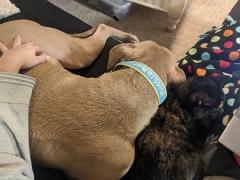Knauss legislative fellowships in Congress help build careers — and they're fun and educational. See our video and fact sheet for details.
Searching for the Bright Side: Graduate studies during a pandemic
Where I live, this time of year is usually one of the best times.
Maybe you can picture it: Ocean City, Maryland, in the off-season. Friends are greeting each other on a not-too-crowded boardwalk. There’s no wait for a table at the best seafood restaurants, which have great specials like half-price entrees. Many people are in the gym working out—a seasonal phenomenon since no one goes to the gym in the summer because everyone is working. It's kind of a running joke that everyone is in better shape in the winter when everyone is wearing more clothes, which is the opposite of people living other places.
This year, that’s not happening. There aren’t tourists coming into town to get a change of scenery. We don’t get to grab a beer with friends we might run into while out on a bike ride. We don’t get to eat at restaurants because those that are open can only serve carry-out. For weeks, it has been like this: social distancing, alone time, and quiet in a place known for camaraderie.
This sudden strangeness is all because of the COVID-19 pandemic, which is not only affecting my social life, but also my schooling. I’m in the last semester of my master’s program in biology at Salisbury University. Fortunately, last semester I’d finished all of my classes that would have required me to be on campus. Thank goodness I’ve also completed all of my field sampling. I couldn’t imagine the stress of trying to coordinate with two of my advisors as well as another student to go out with me to collect samples—not to mention that it would be impossible to maintain the recommended six-foot distance from one another while confined to a small boat.
With just about everything closed, I now have very few options other than to work on my thesis, which focuses on whether factors like salinity, dissolved oxygen, and temperature affect interactions between ctenophores and forage fish in Maryland’s Coastal Bays. Ctenophores are stinger-less jellies that share the same diet as some juvenile fish, but some can also prey upon juvenile fish. To see how much of this happens in our local waters, I evaluate stable isotopes, elements that make up all life and that scientists use to trace food webs as well as represent who is a predator and who might be prey.
But while I suddenly have more time, I still have to focus on writing and not get distracted by all the fun things I can do inside. I have to hide my video games, not take endless naps, or get sucked into a Netflix binge of shows that until now didn’t even know existed.
And, I’m also a teaching assistant, or TA, for a Biology 101 class for non-biology majors, which has added an extra layer of uncertainty to my days. Like many other schools, Salisbury University has closed and moved classes online. Shifting abruptly to online studies creates a major learning curve not only for the students but for the teachers as well. As a graduate student and a TA, I have been doubly affected.
As a TA, I didn’t know what resources are available to me. I dreaded the possibility of having to record myself on video for class, and how in the world was I supposed to teach hands-on laboratory sessions online? Luckily, I work with a really awesome instructor. She changed the class’s focus to be relevant to what we are living through—looking at how climate change, bacteria, and viruses individually relate to the human population. That has allowed us to sidestep the hands-on aspect of labs. Instead, lab time is now incorporated into the class lecture sessions with reading and videos.
But as a TA, I’m a bit unhappy because the time I spent preparing to teach them in person—making PowerPoint presentations and quizzes, practicing how to do the labs, and figuring out how to best communicate information—seems wasted. Also, I’m sad I don’t get to see the students. Even though some of them were less than enthusiastic, it was great seeing even just one student get excited about what was going on in a lab session that I helped teach. Now, my interactions with my students are through email.I am worried, though, because like me, some students are hands-on learners and these concepts can be difficult to grasp without that element. They might not be able to understand material as well or retain as much information as they would in an in-person lab. On the plus side, they get to explore new information that this class had not offered previously on something that affects us all—how and why we get sick.
In about two weeks, I have to publicly defend my thesis. It will be interesting to see how giving a defense over Zoom will be. With all this extra time I should be well prepared for this milestone. More good news: I won’t have hundreds of eyes in one room staring at me—they’ll just be squares on a small screen.
It's just one more way I’m trying to look at the bright side and find a silver lining in a scary and uncertain time.
See all posts to the Fellowship Experiences blog




